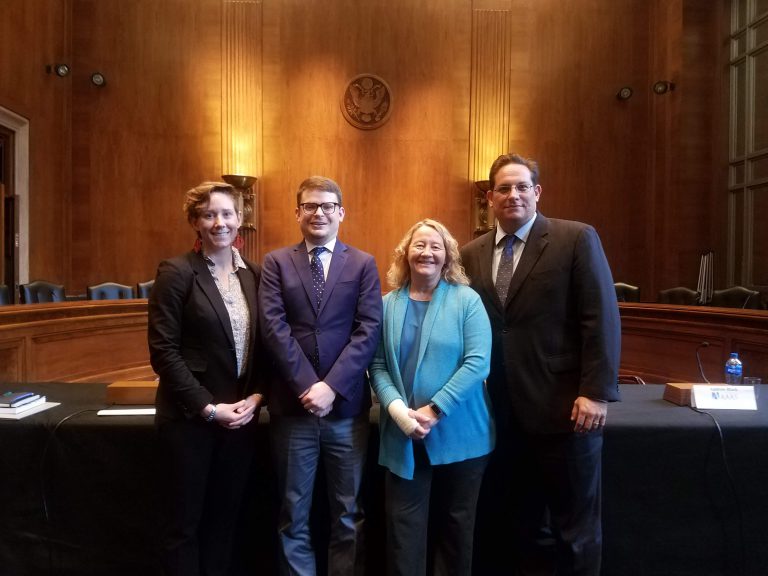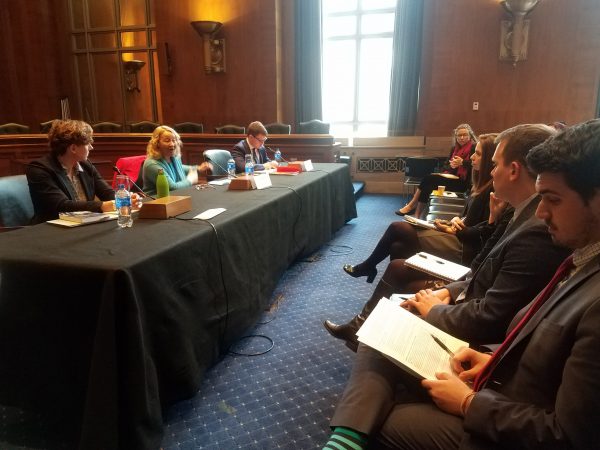ASBMB convenes panel to discuss how Congress can address sexual harassment in science
The American Society for Biochemistry and Molecular Biology hosted a congressional briefing Dec. 6 to discuss the U.S. Congress’s role in addressing sexual harassment and misconduct in science.
University of Illinois professor Kathryn Clancy, Nobel laureate Carol Greider and Andrew Black of the American Association for the Advancement of Science discussed policies and legislation in front of an audience of congressional staffers and representatives of scientific societies.
 Panelists Kathryn Clancy, Andrew Black, and Carol Greider, with moderator Benjamin Corb.
Panelists Kathryn Clancy, Andrew Black, and Carol Greider, with moderator Benjamin Corb.
Clancy, a member of the National Academies of Science’s committee on sexual harassment in academia, said there are few protections for scientists doing research.
Like other researchers doing human subject research, Clancy must tell review boards how her subjects will be protected. However, “I don’t have to prove in any way that I am taking the safety of my own research personnel seriously,” she said.
Clancy urged legislators to protect complainants from retaliation by their harassers.
“Reporting is not the only solution,” she said, “but in those moments when folks are coming forward … we really need to be thinking about what we can do to protect them from the anticipatory retaliation.”
When asked what is needed to combat sexual harassment, Clancy noted the lack of research on best practices to mitigate harassment in the workplace.
“We need to increase the funding for climate surveys and do a better job measuring progress as we start to implement some of these changes,” she said.
Clancy’s recommendations stem from the National Academies’ sexual harassment of women in STEM report, of which she was a contributing author.
Greider, an ASBMB member and outspoken activist on sexual and gender misconduct, warned about Education Secretary Betsy Devos’ attempts to weaken Title IX, the law that prevents discrimination on the basis of sex in any federally funded institution.
A feature article about sexual harassment in science published in ASBMB Today describes Title IX and the challenges of enforcing it.
While acknowledging that the law is imperfect, Greider said, “Don’t break Title IX.”
Greider also spoke about the need to make sexual harassment findings at universities more public.
“Try to remove legal obstacles that cause silence about the investigation,” she said. “Without being able to talk about the outcomes, if there’s an investigation … and there’s a finding, nothing is said and the [harasser] disappears. There has to be some way to allow dissemination about what happened to these people.”

Andrew Black, chief of staff and external affairs officer at AAAS, said his organization hosted a consortium that brought together scientific societies, including the ASBMB, to discuss how they can work together on sexual harassment.
AAAS is also working on an initiative to reward research institutes that are making efforts to improve diversity and inclusion.
“Earlier this year we launched an exciting new mission called SEA Change, ‘SEA’ standing for ‘STEM equity achievement,’” he said. “What we really need to focus on is digging deep on cultural and institutional change. SEA Change supports this change.”
When asked about current legislation, Black pointed to H.R. 7031, the Combatting Sexual Harassment in Science Act of 2018 sponsored by Rep. Eddie Bernice Johnson, D-Texas. The bill would provide funding to study the effects of sexual harassment in STEM and look at policies to reduce harassment.
While H.R. 7031 would address one of Clancy’s recommendations, she said federal science agencies have a role to play in changing the culture of science. And she noted the disparity among federal science agencies’ handling of sexual harassment in science.
The ASBMB applauded the National Science Foundation’s proposed rule changes in May regarding sexual harassment and has recently urged the National Institutes of Health to develop more stringent policies to address sexual harassment at institutions funded by the agency.
Clancy highlighted the need for funding agencies to create better reporting mechanisms and enforce sanctions on scientists found guilty of harassment.
“This is something that the NSF has been fairly aggressively pursuing,” Clancy said, “and it’s worth asking why other federal funding agencies have not been pursuing this as aggressively.”
She addressed the audience directly.
“It would be great for legislative bodies to encourage them to do so.”

Enjoy reading ASBMB Today?
Become a member to receive the print edition four times a year and the digital edition monthly.
Learn moreGet the latest from ASBMB Today
Enter your email address, and we’ll send you a weekly email with recent articles, interviews and more.
Latest in Policy
Policy highlights or most popular articles

Women’s health cannot leave rare diseases behind
A physician living with lymphangioleiomyomatosis and a basic scientist explain why patient-driven, trial-ready research is essential to turning momentum into meaningful progress.

Building a stronger future for research funding
Hear from Eric Gascho of the Coalition for Health Funding about federal public health investments, the value of collaboration and how scientists can help shape the future of research funding.

Councilors advocate for science on Capitol Hill
ASBMB Councilors meet with their elected officials to advocate for basic scientific research funding and training the next generation of scientists.

Hope for a cure hangs on research
Amid drastic proposed cuts to biomedical research, rare disease families like Hailey Adkisson’s fight for survival and hope. Without funding, science can’t “catch up” to help the patients who need it most.

Supporting science through advocacy and community building
ASBMB calls on scientists to take action as funding cuts and policy shifts threaten the U.S. research enterprise, emphasizing the power of community advocacy and persistence in protecting the future of science.

Seven steps to advocating in your home state
Find out how to schedule, prepare for and conduct a productive district office meeting to communicate the importance of fundamental scientific research funding to your representatives.

